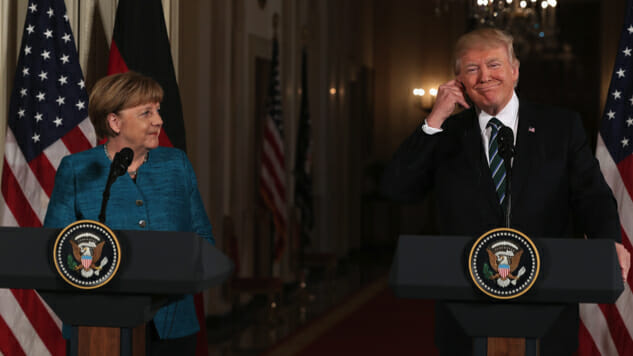This is the (Russian) Reason Why Trump Refused to Play Nice With Merkel
Photo by Justin Sullivan/Getty
Though it appears that America can’t trust Trump to follow through on the bulk of his promises, or hope that he’ll hold the office of President with a sense of dignity not shown to us on the campaign trail, we thought we could trust him to just shake the hands of a foreign leader. He is, after all, a living marketing ploy—not unlike a Kardashian—studied in the fine art of photo-op and public appearance. But, on an awkward Friday afternoon, there Trump sat looking as empty and vapid as ever next to Angela Merkel, the German Chancellor. And there they sat as a photographer called out for a handshake. Then silence, Trump staring at the cameras as if he had suddenly turned into a deaf/mute. Merkel was forced to lean over and ask him herself if he wanted to do a handshake. No response. The whole exchange is about ten seconds long, and is among the most painful of exchanges from an already embarrassing President. But why? Why snub Merkel?
Because that’s what Putin would have wanted.
The world is a giant board game with different players jockeying for position, status, and, most importantly, power. Diplomacy is the les regles du jeu, the manual by which all national relations are played out. By these rules, a handshake is not just a handshake, a phone call is never just a phone call. In fact, Trump made a series of diplomatic faux pas when he first claimed victory, speaking to a country like Taiwan although it bucked a tradition going back to Nixon. Calls suggesting that Trump knew what he was doing do not diminish the sense of amateurism within this administration—or the need for a later mea culpa with China. But they do suggest that, if true, he knows when he’s doing something that he shouldn’t be doing.
Angela Merkel is right now one of the most powerful leaders in Europe, certainly the head of the European Union and by some estimations, the leader of the Free World—a phrase usually reserved for the American president. In terms of diplomacy, snubbing her is snubbing the most powerful woman in the world, and one of our closest allies. So when Trump refused to shake Merkel’s hand, he was sending a pointed message that America would no longer be playing by the social niceties grounded since May of 1945 with the collapse of Nazi Germany, and the splitting up of West Germany and East Germany by the Berlin Wall.
Oversimplified, West Germany was run like much of Western Europe and heavily influenced by American relations, and East Germany was essentially a Russian (USSR, then) colony. It was here that Merkel was raised, with an intimate knowledge of a Russian state, speaking Russian fluently. The state was in period of decay, with everyday life run by the Secret Police, known as the Stasi. Visits outside of the state, and especially to the West, were limited if they were permitted at all. It was as closed off as a country could be, so reunification in 1989 was a shock to the system of all of East Germany, but in a way, it was another colony loss for Russia.
-

-

-

-

-

-

-

-

-

-

-

-

-

-

-

-

-

-

-

-

-

-

-

-

-

-

-

-

-

-

-

-

-

-

-

-

-

-

-

-








































